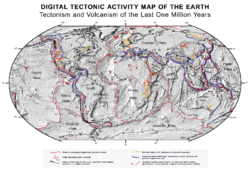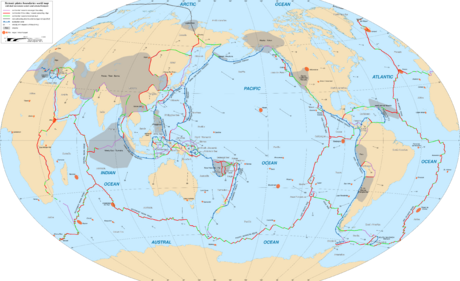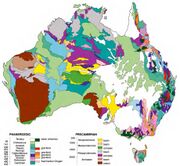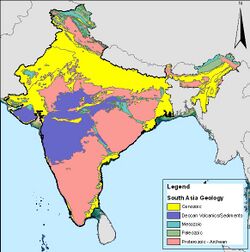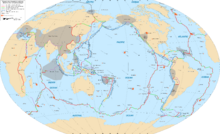Earth:List of tectonic plates

Divergent:
This is a list of tectonic plates on Earth's surface. Tectonic plates are pieces of Earth's crust and uppermost mantle, together referred to as the lithosphere. The plates are around 100 km (62 mi) thick and consist of two principal types of material: oceanic crust (also called sima from silicon and magnesium) and continental crust (sial from silicon and aluminium). The composition of the two types of crust differs markedly, with mafic basaltic rocks dominating oceanic crust, while continental crust consists principally of lower-density felsic granitic rocks.
Current plates
Geologists generally agree that the following tectonic plates currently exist on Earth's surface with roughly definable boundaries. Tectonic plates are sometimes subdivided into three fairly arbitrary categories: major (or primary) plates, minor (or secondary) plates, and microplates (or tertiary plates).[1]
Major plates
These plates comprise the bulk of the continents and the Pacific Ocean. For purposes of this list, a major plate is any plate with an area greater than 20 million km2.
- Earth:African Plate – Tectonic plate underlying Africa – 61,300,000 km2
- Earth:Antarctic Plate – Major tectonic plate containing Antarctica and the surrounding ocean floor – 60,900,000 km2
- Earth:Eurasian Plate – Tectonic plate which includes most of the continent of Eurasia – 67,800,000 km2
- Earth:Indo-Australian Plate – A major tectonic plate formed by the fusion of the Indian and the Australian plates (sometimes considered to be two separate tectonic plates) – 58,900,000 km2
- Earth:Australian Plate – Major tectonic plate separated from Indo-Australian Plate about 3 million years ago – 47,000,000 km2
- Earth:Indian Plate – Minor plate that separated from Gondwana – 11,900,000 km2
- Earth:North American Plate – Large tectonic plate including most of North America, Greenland and part of Siberia – 75,900,000 km2
- Earth:Pacific Plate – Oceanic tectonic plate under the Pacific Ocean – 103,300,000 km2
- Earth:South American Plate – Major tectonic plate which includes most of South America and a large part of the south Atlantic – 43,600,000 km2
Minor plates
These smaller plates are often not shown on major plate maps, as the majority of them do not comprise significant land area. For purposes of this list, a minor plate is any plate with an area less than 20 million km2 but greater than 1 million km2.
- Earth:Amurian Plate – A minor tectonic plate in eastern Asia
- Earth:Arabian Plate – Minor tectonic plate – 5,000,000 km2
- Earth:Burma Plate – Minor tectonic plate in Southeast Asia – 1,100,000 km2
- Earth:Caribbean Plate – A mostly oceanic tectonic plate including part of Central America and the Caribbean Sea – 3,300,000 km2
- Earth:Cocos Plate – Young oceanic tectonic plate beneath the Pacific Ocean off the west coast of Central America – 2,900,000 km2
- Earth:Indian Plate – Minor plate that separated from Gondwana – 11,900,000 km2
- Earth:Nazca Plate – Oceanic tectonic plate in the eastern Pacific Ocean basin – 15,600,000 km2[note 1]
- Earth:New Hebrides Plate – Minor tectonic plate in the Pacific Ocean near Vanuatu – 1,100,000 km2
- Earth:Okhotsk Plate – Minor tectonic plate in Asia
- Earth:Philippine Sea Plate – Oceanic tectonic plate to the east of the Philippines – 5,500,000 km2
- Earth:Scotia Plate – Minor oceanic tectonic plate between the Antarctic and South American plates – 1,600,000 km2
- Earth:Somali Plate – Minor tectonic plate including the east coast of Africa and the adjoining seabed – 16,700,000 km2
- Earth:Sunda Plate – Tectonic plate including Southeast Asia
- Earth:Yangtze Plate – Small tectonic plate carrying the bulk of southern China
Microplates
These plates are often grouped with an adjacent principal plate on a tectonic plate world map. For purposes of this list, a microplate is any plate with an area less than 1 million km2. Some models identify more minor plates within current orogens (events that lead to a large structural deformation of Earth's lithosphere) like the Apulian, Explorer, Gorda, and Philippine Mobile Belt plates. [2] One study has theorized that microplates may be the basic elements of which the crust is composed. [3]
- African Plate
- Earth:Lwandle Plate – Mainly oceanic tectonic microplate off the southeast coast of Africa
- Earth:Rovuma Plate – One of three tectonic microplates that contribute to the Nubian Plate and the Somali Plate
- Antarctic Plate
- Earth:Shetland Plate – Tectonic microplate off the tip of the Antarctic Peninsula
- Australian Plate
- Earth:Capricorn Plate – Proposed minor tectonic plate under the Indian Ocean
- Earth:Futuna Plate – Very small tectonic plate near the south Pacific island of Futuna
- Earth:Kermadec Plate – Tectonic plate in the south Pacific Ocean
- Earth:Maoke Plate – Small tectonic plate in western New Guinea
- Earth:Niuafo'ou Plate – Small tectonic plate west of Tonga
- Earth:Tonga Plate – Small tectonic plate in the southwest Pacific Ocean
- Earth:Woodlark Plate – Small tectonic plate located to the east of the island of New Guinea
- Caribbean Plate
- Earth:Gonâve Microplate – Part of the boundary between the North American Plate and the Caribbean Plate
- Earth:Panama Plate – Small tectonic plate in Central America
- Cocos Plate
- Earth:Rivera Plate – Small tectonic plate off the west coast of Mexico
- Eurasian Plate
- Earth:Adriatic Plate, also known as the Apulian Plate – A small tectonic plate in the Mediterranean
- Earth:Aegean Sea Plate, also known as Hellenic Plate – A small tectonic plate in the eastern Mediterranean Sea
- Earth:Anatolian Plate – Continental tectonic plate comprising most of the Anatolia (Asia Minor) peninsula
- Earth:Banda Sea Plate – Minor tectonic plate underlying the Banda Sea in southeast Asia
- Earth:Hreppar Microplate – Small tectonic plate in south Iceland, between the Eurasian Plate and the North American Plate
- Earth:Iberian Plate – Small tectonic plate now part of the Eurasian plate
- Earth:Iranian Plate – Small tectonic plate including Iran and Afghanistan, and parts of Iraq and Pakistan
- Earth:Molucca Sea Plate – Small fully subducted tectonic plate near Indonesia
- Earth:Halmahera Plate – Small tectonic plate in the Molucca Sea
- Earth:Sangihe Plate – Microplate within eastern Indonesia
- Earth:Okinawa Plate – Minor tectonic plate from the northern end of Taiwan to the southern tip of Kyūshū
- Earth:Pelso Plate – Small tectonic unit in the Pannonian Basin in Europe
- Earth:Timor Plate – Microplate in Southeast Asia carrying the island of Timor and surrounding islands
- Earth:Tisza Plate – Tectonic microplate, in present-day Europe
- Earth:Juan de Fuca Plate – Small tectonic plate in the eastern North Pacific – 250,000 km2
- Earth:Explorer Plate – Oceanic tectonic plate beneath the Pacific Ocean off the west coast of Vancouver Island, Canada
- Earth:Gorda Plate – One of the northern remnants of the Farallon Plate
- Nazca Plate
- Earth:Coiba Plate – Tectonic plate off the coast south of Panama and northwestern Colombia
- Earth:Malpelo Plate – A small tectonic plate off the coast west of Ecuador and Colombia
- North American Plate
- Earth:Greenland Plate – Supposed tectonic microplate containing the Greenland craton[4]
- Earth:Queen Elizabeth Islands Subplate – Small tectonic plate containing the Queen Elizabeth Islands of Northern Canada
- Pacific Plate
- Earth:Balmoral Reef Plate – Small tectonic plate in the south Pacific north of Fiji
- Earth:Bird's Head Plate – Small tectonic plate in New Guinea
- Earth:Conway Reef Plate – Small tectonic plate in the south Pacific west of Fiji
- Earth:Easter Microplate – Very small tectonic plate to the west of Easter Island
- Earth:Galápagos Microplate – Very small tectonic plate at the Galapagos Triple Junction
- Earth:Manus Plate – Tiny tectonic plate northeast of New Guinea
- Earth:North Bismarck Plate – Small tectonic plate in the Bismarck Sea north of New Guinea
- North Galápagos Microplate – Tectonic plate off west South America
- Earth:South Bismarck Plate – Small tectonic plate in the southern Bismarck Sea
- Earth:Trobriand Plate – Small tectonic plate located to the east of the island of New Guinea
- Philippine Sea Plate
- Earth:Philippine Mobile Belt, also known as Philippine Microplate – Tectonic boundary
- Scotia Plate
- Earth:South Sandwich Plate – Small tectonic plate south of the South American Plate
- Somali Plate
- Earth:Madagascar Plate – Tectonic plate formerly part of the supercontinent Gondwana
- South American Plate
Ancient tectonic plates
In the history of Earth, many tectonic plates have come into existence and have over the intervening years either accreted onto other plates to form larger plates, rifted into smaller plates, or have been crushed by or subducted under other plates.
The following is a list of ancient cratons, microplates, plates, and terranes which no longer exist as separate plates. Cratons are the oldest and most stable parts of the continental lithosphere, and shields are exposed parts of them. Terranes are fragments of crustal material formed on one tectonic plate and accreted to crust lying on another plate, which may or may not have originated as independent microplates: a terrane may not contain the full thickness of the lithosphere.
African Plate
- Earth:Atlantica – Ancient continent formed during the Proterozoic about 2 billion years ago
- Earth:Congo Craton – Precambrian craton that with four others makes up the modern continent of Africa (Angola, Cameroon, Central African Republic, Democratic Republic of Congo, Gabon, Sudan, and Zambia)
- Earth:Kalahari Craton – African geological area (South Africa)
- Earth:Saharan Metacraton – Large area of continental crust in the north-central part of Africa (Algeria)
- Earth:Tanzania Craton – Old and stable part of the continental lithosphere in central Tanzania (Tanzania)
- Earth:West African Craton – One of the five cratons of the Precambrian basement rock of Africa that make up the African Plate (Algeria, Benin, Burkina Faso, Côte d'Ivoire, Gambia, Ghana, Guinea, Guinea Bissau, Liberia, Mali, Mauritania, Morocco, Nigeria, Senegal, Sierra Leone, and Togo)
- Zaire Craton (Congo)
Antarctic Plate
- Earth:Bellingshausen Plate – Ancient tectonic plate that fused onto the Antarctic Plate
- Earth:Charcot Plate – Fragment of the Phoenix tectonic plate fused to the Antarctic Peninsula
- Earth:East Antarctic Shield, also known as East Antarctic Craton – Cratonic rock body which makes up most of the continent Antarctica
Eurasian Plate
- Armorica – Microcontinent or group of continental fragments rifted away from Gondwana (France, Germany, Spain and Portugal)
- Earth:Avalonia – Microcontinent in the Paleozoic era (Canada , Great Britain, and United States )
- Earth:Baltic Plate – Ancient tectonic plate from the Cambrian to the Carboniferous Period
- Belomorian Craton
- Central Iberian Plate
- Cimmerian Plate – Ancient string of microcontinents that rifted from Gondwana (Anatolia, Iran, Afghanistan, Tibet, Indochina and Malaya)
- East China Craton[citation needed]
- Earth:East European Craton – Geology of Europe
- Place:Baltic Shield, also known as Fennoscandian Shield – Ancient segment of Earth's crust
- Junggar Plate – Geographical subregion in Northwest China and Eastern Kazakhstan
- Earth:Kazakhstania – Geological region in Central Asia and the Junngar Basin in China
- Earth:Lhasa terrane – Fragment of crustal material that forms present-day southern Tibet
- Earth:Massif Central – A highland region in the middle of Southern France
- Moravo Silesian Plate
- Earth:Midlands Microcraton – Block of late Neoproterozoic crust which underlies the English Midlands
- Earth:North China Craton – Continental crustal block in northeast China, Inner Mongolia, the Yellow Sea, and North Korea
- Ossa-Morena Plate
- Piemont-Liguria Plate – Former piece of oceanic crust that is seen as part of the Tethys Ocean
- Proto-Alps Terrane
- Rhenohercynian Plate
- Siberian Craton – Ancient craton forming the Central Siberian Plateau
- South Portuguese Plate
- Tarim Craton
- Teplá-Barrandian Terrane
- Earth:Ukrainian Shield – The southwest shield of the East European craton
- Valais Plate – Subducted ocean basin. Remnants found in the Alps in the North Penninic nappes.
- Volgo-Uralian Craton
- Yakutai Craton
- Yangtze Craton – An ancient continent that contained today's South and Southeast China, Indochina, and parts of Southeast Asia
Indo-Australian Plate
- Altjawarra Craton (Australia)
- Bhandara Craton, (India)
- Bundelkhand Craton, (India)
- Central Craton (Australia)
- Curnamona Craton (Australia)
- Earth:Gawler Craton – Province of the larger West Australian Shield in central South Australia
- Earth:Pilbara Craton – Old and stable part of the continental lithosphere located in Pilbara, Western Australia
- Singhbhum Craton (India)
- Earth:Yilgarn Craton – Large craton in Western Australia
- Earth:Australian Shield, also known as Western Australian Shield – Large part of the continent of Australia
- Earth:Zealandia – Mostly submerged continental crust area in Oceania. See Moa Plate and Lord Howe Rise
North American Plate
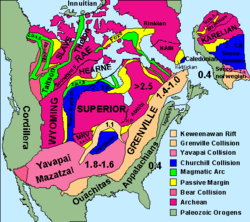
- Earth:Avalonia – Microcontinent in the Paleozoic era (Canada, Great Britain, and United States)
- Earth:Churchill Craton – Northwest section of the Canadian Shield from southern Saskatchewan and Alberta to northern Nunavut (Canada)
- Earth:Farallon Plate – Ancient oceanic plate that has mostly subducted under the North American Plate (split into the Cocos, Explorer, Juan de Fuca, Gorda Plates, Nazca Plate, and Rivera Plates)
- Earth:Hearne Craton – Craton in northern Canada (Canada)
- Laurentian Craton, also known as North American Craton – A large continental craton that forms the ancient geological core of the North American continent (Canada and United States)
- Earth:Insular Plate – Ancient oceanic plate
- Earth:Intermontane Plate – Ancient oceanic tectonic plate on the west coast of North America about 195 million years ago
- Earth:Izanagi Plate – Ancient tectonic plate, which was subducted beneath the Okhotsk Plate
- Mexican Plate
- Earth:Nain Province – Part of the North Atlantic Craton in Labrador, Canada (Canada)
- Newfoundland Plate
- Nova Scotia Plate
- Earth:Rae Craton – Archean craton in northern Canada north of the Superior Craton (Canada)
- Sask Craton (Canada)
- Earth:Sclavia Craton – Late Archean supercraton (Canada)
- Earth:Slave Craton – Archaean craton in the north-western Canadian Shield, in Northwest Territories and Nunavut (Canada)
- Earth:Superior Craton – Large crustal block in North America (Canada)
South American Plate
- Earth:Amazonian Craton – Geologic province in South America (Brazil )
- Earth:Río de la Plata Craton – Medium-sized continental block in Uruguay, eastern Argentina and southern Brazil (Argentina and Uruguay)
- Earth:São Francisco Craton – Ancient craton in eastern South America (Brazil)
See also
- Earth:Asthenosphere – Highly viscous, mechanically weak, and ductile region of Earth's mantle
- Earth:Continent – Large geographical region identified by convention
- Earth:Craton – Old and stable part of the continental lithosphere
- Earth:Earth's crust – Earth's outer shell of rock
- Earth:Continental crust – Layer of rock that forms the continents and continental shelves
- Earth:Oceanic crust – Uppermost layer of the oceanic portion of a tectonic plate
- Earth:Earth's mantle – A layer of silicate rock between Earth's crust and its outer core
- Lower mantle – The region from 660 to 2900 km below Earth's surface
- Chemistry:Geochemistry – Science that applies chemistry to analyze geological systems
- Earth:Sial – Rocks rich in aluminium silicate minerals
- Sima – Rocks rich in magnesium silicate minerals
- Earth:Hydrosphere – Total amount of water on a planet
- Earth:Lithosphere – Outermost shell of a terrestrial-type planet or natural satellite
- Earth:Ocean – Body of salt water covering the majority of Earth
- Earth:Plate tectonics – Movement of Earth's lithosphere
- List of tectonic plate interactions – Types of plate boundaries
- Earth:Supercontinent – Landmass comprising more than one continental core, or craton
Notes and references
Notes
References
- ↑ Madaan, About Sonia (2020-08-18). "7 Major Tectonic Plates (Pacific, African, Eurasian, Antarctic and more)". How Many Tectonic Plates Are on Earth?. https://eartheclipse.com/geology/tectonic-plates.html#How_Many_Tectonic_Plates_Are_on_Earth.
- ↑ Bird, P. (2003). "An updated digital model of plate boundaries". Geochemistry, Geophysics, Geosystems 4 (3): 1027. doi:10.1029/2001GC000252. http://peterbird.name/publications/2003_PB2002/2003_PB2002.htm.
- ↑ van Dijk, J.P. (2023); The New Global Tectonic Map - Analyses and Implications. Terra Nova, 2023, 27 pp. DOI 10.1111/TER.12662
- ↑ Niels Henriksen; A.K. Higgins; Feiko Kalsbeek; T. Christopher R. Pulvertaft (2000). "Greenland from Archaean to Quaternary". Greenland Survey Bulletin (185). http://www.geus.dk/publications/bull-gl/nr185/nr185_p12-24.pdf.
Bibliography
- North Andes Plate
- Restrepo, Jorge Julián; Ordóñez Carmona, Oswaldo; Martens, Uwe; Correa, Ana María (2009). "Terrenos, complejos y provincias en la Cordillera Central de Colombia (Terrains, complexes and provinces in the central cordillera of Colombia)". Ingeniería Investigación y Desarrollo 9: 49–56. https://revistas.uptc.edu.co/index.php/ingenieria_sogamoso/article/view/908. Retrieved 2019-10-31.
- Fuck, Reinhardt A.; Brito Neves, Benjamim Bley; Schobbenhaus, Carlos (2008). "Rodinia descendants in South America". Precambrian Research 160: 108–126. https://www.researchgate.net/publication/287701535_From_Rodinia_to_Western_Gondwana_An_approach_to_the_Brasiliano-Pan_African_Cycle_and_orogenic_collage. Retrieved 2019-10-29.
- Cordani, U.G.; Cardona, A.; Jiménez, D.M.; Dunyl, L.; Nutman, A.P. (2003). "Geochronology of Proterozoic basement from the Colombian Andes: Tectonic history of remnants from a fragmented Grenville Belt". 10o Congreso Geológico Chileno. pp. 1–10.
- Restrepo, Jorge Julian; Toussaint, Jean F. (1988). "Terranes and continental accretion in the Colombian Andes". Episodes 11: 189–193. https://www.researchgate.net/publication/279701945_Terranes_and_Continental_Accretion_in_the_Colombian_Andes. Retrieved 2019-10-31.
External links
- Bird, Peter (2003) An updated digital model of plate boundaries also available as a large (13 Mb) PDF file
 |
